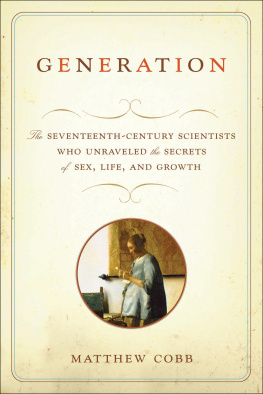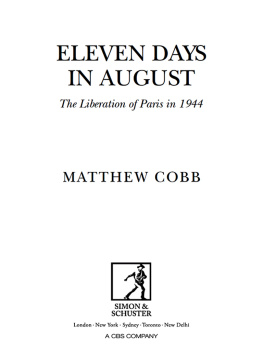The story of the most complex object in the universe has never been told with greater clarity, insight and wit. Charting the route to future discoveries, this is a masterpiece. Adam Rutherford, author of The Book of Humans
Not only is this a work of phenomenal erudition, but it has the rare distinction among books on the brain of promoting no premature explanation of how this astonishingly complicated organ does its job. Instead, Cobb offers an honest appraisal both of what we know and what is still a mystery. There is no better primer to one of the most profound questions facing science today: how matter creates thought and consciousness. Philip Ball, author of How to Grow a Human
Thoughtful and thought-provoking, this is a book I wish I could have written, and one that I will be thinking about for a long time. It is a down payment for future brain research. Marina Picciotto, editor-in-chief, Journal of Neuroscience
Humanitys quest to understand the brain has led us to some of our most important ideas, but as Matthew Cobb shows in his riveting, eye-opening book, that isnt all it gave us. In fact, the road to our hi-tech present was strewn with brutes, eccentrics and victims. Highly entertaining and deeply authoritative. Read it. Paul Mason, author of Clear Bright Future
The Idea of the Brain is a superb book describing the surprising history of research on how the Universes most complex object produces memories, consciousness and volition. Jerry Coyne, author of Why Evolution is True
This exquisitely researched and thrilling book charts an epic quest to understand our deepest selves. Its scale and scope is phenomenal, and it leaves us with a profound sense of wonder about science and humanity, as well as the brain itself. Altogether a feast. Daniel M. Davis, author of The Beautiful Cure
A scholarly and wonderfully entertaining guide to the advances that have driven our knowledge of the brain, and the extraordinary people who have made them. Chris Frith, author of Making Up the Mind
A masterful examination of the vast history of humans trying to figure out how the brain does its tricks. The scope, sweep and insight are stunning. Michael Gazzaniga, author of The Consciousness Instinct
Cobb is a reliably sceptical but sympathetic guide to the murky world of mind exploration, offering plenty of diverting stories along the way. You may be no closer to understanding your brain after reading this, but your brain will be richer for it. Gaia Vince, author of Transcendence
ALSO BY MATTHEW COBB
Lifes Greatest Secret: The Race to Crack the Genetic Code
The Egg and Sperm Race: The 17th-Century Scientists Who Unravelled the Secrets of Sex, Life and Growth
Smell: A Very Short Introduction
The Resistance: The French Fight Against the Nazis
Eleven Days in August: The Liberation of Paris in 1944
THE IDEA OF THE BRAIN
A HISTORY
Matthew Cobb

First published in Great Britain in 2020 by
PROFILE BOOKS LTD
29 Cloth Fair
London EC1A 7JQ
www.profilebooks.com
Copyright Matthew Cobb, 2020
The moral right of the author has been asserted.
Cover design: Samantha Johnson
Cover image: iStock
All rights reserved. Without limiting the rights under copyright reserved above, no part of this publication may be reproduced, stored or introduced into a retrieval system, or transmitted, in any form or by any means (electronic, mechanical, photocopying, recording or otherwise), without the prior written permission of both the copyright owner and the publisher of this book.
A CIP catalogue record for this book is available from the British Library.
ISBN 9781781255896
eISBN 9781782832256
In memory of Kevin Connolly (19372015),
Professor of Psychology at the University of Sheffield,
who set me on the road to here.
The brain being indeed a machine, we must not hope to find its artifice through other ways than those which are used to find the artifice of the other machines. It thus remains to do what we would do for any other machine; I mean to dismantle it piece by piece and to consider what these can do separately and together.
Nicolaus Steno, On the Brain, 1669
INTRODUCTION
In 1665 the Danish anatomist Nicolaus Steno addressed a small group of thinkers gathered together at Issy, on the southern outskirts of Paris. This informal meeting was one of the origins of the French Acadmie des Sciences; it was also the moment that the modern approach to understanding the brain was set out. In his lecture, Steno boldly argued that if we want to understand what the brain does and how it does it, rather than simply describing its component parts, we should view it as a machine and take it apart to see how it works.
This was a revolutionary idea, and for over 350 years we have been following Stenos suggestion peering inside dead brains, removing bits from living ones, recording the electrical activity of nerve cells (neurons) and, most recently, altering neuronal function with the most astonishing consequences. Although most neuroscientists have never heard of Steno, his vision has dominated centuries of brain science and lies at the root of our remarkable progress in understanding this most extraordinary organ.
We can now make a mouse remember something about a smell it has never encountered, turn a bad mouse memory into a good one and even use a surge of electricity to change how people perceive faces. We are drawing up increasingly detailed and complex functional maps of the brain, human and otherwise. In some species we can change the brains very structure at will, altering the animals behaviour as a result. Some of the most profound consequences of our growing mastery can be seen in our ability to enable a paralysed person to control a robotic arm with the power of their mind.
We cannot do everything: at least for the moment, we cannot artificially create a precise sensory experience in a human brain (hallucinogenic drugs do this in an uncontrolled way), although it appears that we have the exquisite degree of control required to perform such an experiment in a mouse. Two groups of scientists recently trained mice to lick at a water bottle when the animals saw a set of stripes, while machines recorded how a small number of cells in the visual centres of the mices brains responded to the image. The scientists then used complex optogenetic technology to artificially recreate that pattern of neuronal activity in the relevant brain cells. When this occurred, the animal responded as though it had seen the stripes, even though it was in complete darkness. One explanation is that, for the mouse, the pattern of neuronal activity was the same thing as seeing. More clever experimentation is needed to resolve this, but we stand on the brink of understanding how patterns of activity in networks of neurons create perception.
This book tells the story of centuries of discovery, showing how brilliant minds, some of them now forgotten, first identified that the brain is the organ that produces thought and then began to show what it might be doing. It describes the extraordinary discoveries that have been made as we have attempted to understand what the brain does, and delights in the ingenious experiments that have produced these insights.
But there is a significant flaw in this tale of astonishing progress, one that is rarely acknowledged in the many books that claim to explain how the brain works. Despite a solid bedrock of understanding, we have no clear comprehension about how billions, or millions, or thousands, or even tens of neurons work together to produce the brains activity.
Next page









